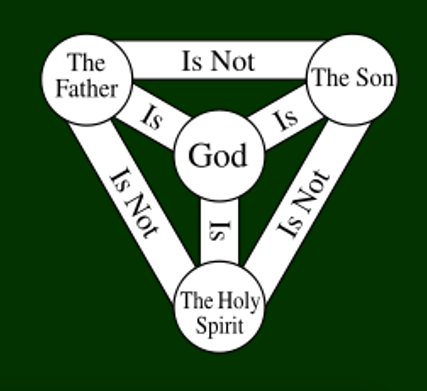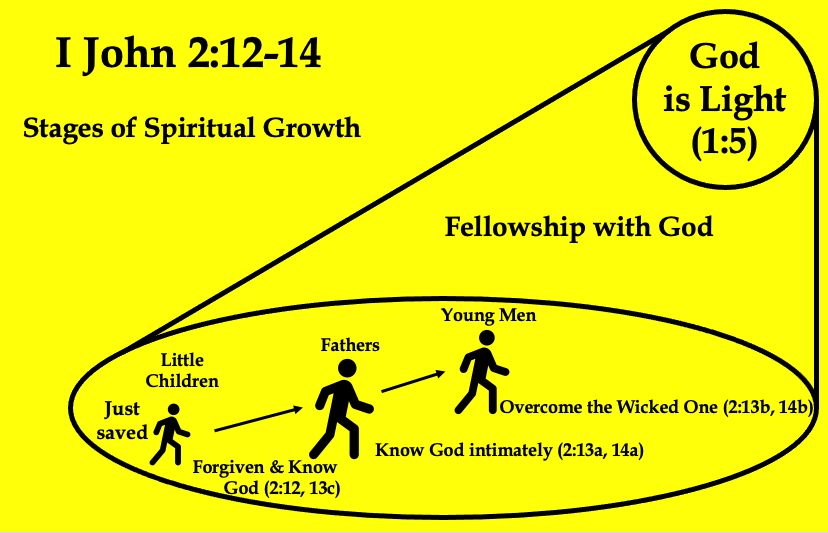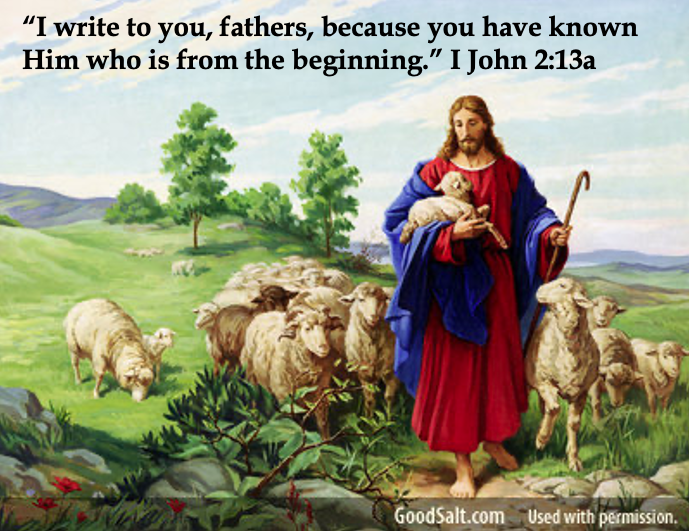“In the beginning was the Word, and the Word was with God, and the Word was God.” John 1:1
From the opening section of the gospel, John addresses this question, “Who is Jesus Christ?” John focuses upon the central fact of our Christian faith: Christianity is not about philosophy; it is about a Person.
While other world religions focus upon rules and regulations, Christianity focuses on a personal relationship with Christ. That is why Jesus Christ is the most widely acclaimed individual in human history. More books have been written, music composed, pictures painted, and dramas performed about Jesus than any other person. Why?
Why did other great figures come and go? Why do others fade into the annals of history but Jesus Christ looms as large in modern society as He did two thousand years ago? Why is He the most powerful Personality to ever appear on this planet? That is the question John answers in these first few verses: Who is Jesus Christ?
We are going to examine the first five verses of John’s gospel in this chapter, and in so doing, we will answer the question, “Who is Jesus?” in these verses and as we uncover who Jesus is, we will be challenged as to why we should believe in Him. Let’s examine three reasons why we should believe in Jesus for eternal life; why we should trust in Him alone to get us to heaven.

BELIEVE ON JESUS BECAUSE HE IS GOD (1:1-2). John begins his gospel in an unusual way. Unlike the writers of Matthew, Mark, and Luke, who begin their accounts of Jesus in an historical context, John opens his gospel in eternity. Unlike Matthew who begins his gospel with the genealogy of Abraham and Mark who begins with the story of John the Baptist, or Luke who starts with a description of John and Jesus’ birth. John moves beyond human history. 1:1a: Do the words, “In the beginning” sound familiar to you? They take us back to Genesis 1:1: “In the beginning, God created the heavens and the earth.” John starts with God. In the Bible, you cannot go any further back than God, and that is where John begins, in eternity past with God’s eternal purpose.
And what does he tell us? 1:1ab: “In the beginning was the Word.” The term “Word” [1] is used by John to refer to the Person of Jesus Christ (John 1:14, 17). A Word expresses a message. Jesus was God’s message to the world. He was and is the perfect expression of God.
What does the Bible tell us about the Word? 1:1ab: HE IS ETERNAL. In the beginning of time and space, the Word already “was.” [2] The Word really had no beginning. There has never been a time when “the Word” was not, because He is eternal. The Word has existed from all eternity. At creation, the Word was already present. He is not a created being as some false religions teach. He has no beginning because He is eternal.
1:1c, 2: HE IS RELATIONAL. The phrase “and the Word was with God” refers to the Word being “with” God the Father in a “face-to-face” relationship. 1:2: “He was in the beginning with God.” Jesus Christ has always enjoyed a personal relationship with His Father. They had perfect fellowship with one another. The word “with” [3] also distinguishes the Word from God the Father. Jesus is separate and distinct from His Father. He has a separate identity. Jesus is a Person, not a principle or Star War’s force. Because Christ is eternal and relational, we can conclude that He desires eternal relationships with those He created.
1:1d: “and the Word was God.” [4] The Word was not “a god” as some false religions mistranslate. The Greek grammar does not allow this. [5] The Word is GOD. These last five words are some of the most important words in all the Bible concerning who Jesus is. He was and is God. Whatever God the Father was, the Word was. Everything that makes God-God, the Word possesses. Jesus Christ is the visible image of the invisible God. When you look at Jesus Christ, you are looking at God in human flesh. Only God can give us life that never ends.
“In other words, the Father and Son are not two distinct gods. Rather, the Son shares the divine nature. Theologically speaking, the Father, Son, and Spirit are co-equal members of the Trinity. Our one God (see Deut. 6:4; 1 Cor. 8:6) exists in three co-equal Persons (see Matt. 28:19).”[6]
Christianity has always taught and believed there is only one God. The difference between our monotheism and other monotheists is not on the number of gods, but on the concept of God’s Personhood. The doctrine of the Trinity teaches that the one God exists as three Persons. This is not a self-contradiction as some charge because person is not the same as being. Your being is the quality that makes you what you are, but your person is the quality that makes you who you are. For example, we are humans. That is what we are. That is why we are called human beings. But what we are is not the same as who we are. If someone asks, “Who are you?” I would not respond by saying, “A human.” That answers the question of what I am, not who I am. Who I am is Jeff; that is my person. What I am is a human; that is my being. Being and person are separate. [7]
Unlike a human being, which has only one person, God has three Persons. He is one being, Yahweh, in three Persons: Father, Son, and Spirit. He is more than able to exist like that because He is God. If we say God must have only one Person, like humans, then we are making God in our image. Who are we to limit God? It is up to God to tell us who He is, and He has in the Bible. [8]
Our human reason alone cannot dictate or even decipher the nature of God. God is far greater than we can possibly conceive and more complex than we could ever hope to grasp. We are in no position to determine the intricacies of God’s nature. If He were to inform us He is one Being in one Person, we are obligated to believe Him. If He tells us, “I am one Being in three Persons,” who are we to say no to God? As believers in revelation, we must turn to divine Scripture to learn about God. [9]
Both the Old Testament (Gen. 1:2, 26; Deut. 32:6; Psalm 2:6-7, 12; 45:6-7; 139:7-12; Isaiah 9:6; 11:2-3; 63:10, 16; Zech. 4:6; Mal. 2:10) and the New Testament (Matt. 3:16-17; John 14:16-17, 26; 2 Cor. 13:14) teach about the distinction between God the Father, God the Son, and God the Holy Spirit. Each Person of the Trinity is equal in every way having the same divine nature, yet distinct in their tasks and relations to humanity.

We see in the chart above that the Father is God, but He is not the Son nor the Holy Spirit. Likewise, the Son is God, but He is neither the Father nor the Holy Spirit. And the Holy Spirit is God, but He is not the Father nor the Son. All three Persons of the Trinity have the same divine nature. They are one being, yet they exist eternally as Father, Son, and Holy Spirit.
Constable writes, “There is probably no fully adequate illustration of the Trinity in the natural world. An egg consists of three parts: shell, yolk, and white. Each part is fully egg, yet each has its own identity that distinguishes it from the other parts. The human family is another illustration. Father, mother, and child are all separate entities—yet each one is fully a member of his or her own family. Each may have a different first name, but all bear the same family name. Light, when passed through a prism, is seen to be composed of three primary colors: red, yellow, and blue. Similarly, the person of God, when revealed in Scripture, is seen to consist of Father, Son, and Holy Spirit. Hydrogen dioxide can be water, ice, and steam and still be H2O.” [10]
Another example of the Trinity is seen in every human being. First Thessalonians 5:23 tells us that every human is comprised of three parts: “spirit, soul, and body.” While each part is fully human, each part is separate and distinct from the others.
The Word is “with” God (separate from Him), yet at the same time, He is fully God. So, John informs us that the Word is God. If we cannot or do not believe this basic truth, we will not have enough faith to trust our eternal destiny to Him. Who is Jesus? He is God. Believe in Him. He wants you to spend eternity with Him in His heaven (cf. John 14:1-3).

BELIEVE ON JESUS BECAUSE HE IS THE CREATOR (1:3). Not only was the Word present at creation, He was also the agent of creation. 1:3: “All things were made through Him.” Does John say that all things were made through evolution? (Pause). No! All things were made through Christ (cf. Col. 1:16; Heb. 1:2)! Everything that exists owes its existence to the Word. He is the Creator. Apart from Him, there is no existence. Jesus Christ created this universe. I believe in the Big Bang alright. God spoke (BOOM) and the universe came into being (Gen. 1-2).
Through Jesus all things “were made,” [11] but He always “was.” [12] Any being “not made or created” or not brought into being because He already existed is God. Three times John uses the word “made” (1:3). Anything that is made has a beginning. At some point in time it did not exist, and then it began to exist. John wants to establish that the Word already existed when He made all things. The Word never had a beginning because He is God. [13]
This is very important to understand because in John’s day to the present, there have been many false religions and teachers who insist that Jesus Christ is not God because He had a beginning. They teach that Christ was the first created being by God who then created everything else. For example, Arius, a third century false teacher, was fond of saying, “There was a time when He [Jesus] was not.” [14]
Swindoll notes that “this teaching continues today as official doctrine for the Church of Jesus Christ of Latter-day Saints (the Mormons) and the Jehovah’s Witnesses, and both organizations have translated John’s prologue to suit their theologies.” [15]
John refutes these false teachings at the beginning of his gospel. But the apostle also wants to emphasize that the Creator knows our inner workings better than anyone; He knows our needs and what it will take to reach us.
A doctor had hired a new secretary. She was pretty and thin. Part of her responsibilities was mailing out the bills to all the doctor’s patients. The doctor began to notice that it was taking more time than should be necessary for her to fulfill this task, and so he observed her one day. He discovered that rather than using the wet sponge to seal the envelopes, she was licking each one. This took a long time. The doctor asked her to use the sponge instead of licking each one, but the new secretary said that she would rather do it the other way. The doctor tried all kinds of motivations to try and convince her to do things his way. He tried telling her how much quicker it would be, he told her that her mouth wouldn’t get so dry. He even tried switching the type of envelopes that he used to one of those kind that had nasty-tasting glue. Nothing worked.
One day, a patient came to her window to pay her bill and noticed that the secretary was licking the envelopes. She said to her, “Did you know that each envelope has about 1 ½ calories?” The secretary immediately stopped and began using a wet sponge. Sometimes it takes a woman to communicate in a woman’s language. Likewise, it takes the Creator to communicate in His creation’s language. Christ spoke to us with love when He took our place and punishment on the cross for our sins (cf. Rom. 5:8; I John 4:9-10).
BELIEVE ON JESUS BECAUSE HE IS THE ONLY SOURCE OF ETERNAL LIFE (1:4-5). John moves now from creation in general to the most significant element of creation – people. 1:4: “In Him was life, and the life was the light of men.” Christ created you and me so that we could enjoy a personal relationship with Him. The word “life” [16] in the gospel of John can refer to physical life (1:3) and spiritual life (1:12). Most often it refers to eternal life in John (3:15-16,36; 4:14, 36; 5:24, 39; 6:27, 40, 47, 54, 58, 68; 10:28; 12:25, 50; 17:2-3). Jesus defines eternal life as knowing the only true God and His Son, Jesus Christ personally in a forever relationship (17:3). Jesus was God’s way of meeting us where we were to take us where we could never go.
Before we come to know Jesus Christ, we are merely existing. We get up, eat breakfast, go to work, come home from work, eat supper, watch TV, and go to bed. Then we repeat the same cycle the next day. That is merely existing. We don’t start living until we enter a personal relationship with Jesus Christ by believing or trusting in Him alone for His gift of eternal life.
When the Bible says, “the life was the light of men” (1:4), it is referring to the hope (“light”) that Christ’s message of eternal (“life”) brings to people in darkness. Also, when we enter a relationship with God (“life”), we become aware of God’s holiness and righteousness (“light”). Life is the foundation for growth in the light (cf. I John 1:5-10).
1:5: John contrasts “the light” of God with “the darkness” of sinful humanity. The word “comprehend,” [17] can also mean “overtake.”[18] The darkness of this world cannot overcome or extinguish the light of Jesus Christ. This contrast between light and darkness represents spiritual conflict. The light of Christ has and will overcome the darkness of sinful people.
“John did not view the world as a stage on which two equal and opposing forces engage in battle; he was not a philosophical dualist. He viewed Jesus as superior to the forces of darkness that sought to overcome Him but could not. This gives humankind hope. The forces of Light are stronger than the forces of Darkness. John was here anticipating the outcome of the story that he would tell, specifically, Calvary. Though darkness continues to prevail, the Light will overcome it.” [19]
“Because of the temptation of Satan, humankind has fallen into the darkness of sin (see Gen. 3). He has blinded the minds of people to keep them from seeing the glory of Christ (see 2 Cor. 4:4). But Jesus has come to bring illumination so that people can see things as they truly are. John’s Gospel shows us how Jesus was continually rejected; nevertheless, the darkness did not overcome His light (1:5). Though His enemies crucified Him, He was actually glorified in His death on the cross (see 13:31-32) and victorious in His resurrection, resulting in the provision of salvation for all people (see John 3:16; Rom. 5:18; 1 Tim. 2:6; Heb. 2:9; 1 John 2:2).” [20]
Remember, John is writing this gospel after the resurrection. He knows that Jesus Christ could not be overcome by the spiritual darkness of this world. He is the winner. The light shines (continually) in the darkness, and the darkness cannot overcome it. A single light penetrates fifty miles of darkness. Darkness cannot overcome light.
Christian author Max Lucado tells the story about a tribe of people who lived in a dark, cold cave: “The cave dwellers would huddle together and cry against the chill. Loud and long, they wailed. It was all they did. It was all they knew to do. The sounds in the cave were mournful, but the people didn’t know it, for they had never known life.
But then, one day, they heard a different voice. “I have heard your cries,” it announced. “I have felt your chill and seen your darkness. I have come to help.”
The cave people grew quiet. They had never heard this voice. Hope sounded strange to their ears. “How can we know you have come to help?”
“Trust me,” he answered. “I have what you need.”
The cave people peered through the darkness at the figure of the stranger. He was stacking something, then stooping and stacking more.
“What are you doing?” one cried, nervous.
The stranger didn’t answer.
“What are you making?” one shouted even louder.
Still no response.
“Tell us!” demanded a third.
The visitor stood and spoke in the direction of the voices. “I have what you need.” With that he turned to the pile at his feet and lit it. Wood ignited, flames erupted, and light filled the cavern.
The cave people turned away in fear. “Put it out!” they cried. “It hurts to see it.”
“Light always hurts before it helps,” he answered. “Step closer. The pain will soon pass.”
“Not I,” declared a voice.
“Nor I,” agreed a second.
“Only a fool would risk exposing his eyes to such light.”
The stranger stood next to the fire. “Would you prefer the darkness? Would you prefer the cold? Don’t consult your fears. Take a step of faith.”
For a long time, no one spoke. The people hovered in groups covering their eyes. The fire builder stood next to the fire. “It’s warm here,” he invited.
“He’s right,” one from behind him announced. “It’s warmer.” The stranger turned and saw a figure slowly stepping toward the fire. “I can open my eyes now,” she proclaimed. “I can see.”
“Come closer,” invited the fire builder.
She did. She stepped into the ring of light. “It’s so warm!” She extended her hands and sighed as her chill began to pass. “Come, everyone! Feel the warmth,” she invited.
“Silence, woman!” cried one of the cave dwellers. “Dare you lead us into your folly? Leave us and take your light with you.”
She turned to the stranger. “Why won’t they come?”
“They choose the chill, for though it’s cold, it’s what they know. They’d rather be cold than change.”
“And live in the dark?”
“And live in the dark.”
The now-warm woman stood silent. Looking first at the dark, then at the man.
“Will you leave the fire?” he asked.
She paused, then answered, “I cannot. I cannot bear the cold.” Then she spoke again. “But nor can I bear the thought of my people in darkness.”
“You don’t have to,” he responded, reaching into the fire and removing a stick. “Carry this to your people. Tell them the light is here, and the light is warm. Tell them the light is for all who desire it.”
And so, she took the small flame and stepped into the shadows.”[21]
Why should I believe on Jesus? Because He is the only source of eternal life. He gives forgiveness instead of fear… grace instead of guilt… cleansing instead of condemnation… mercy instead of misery… life instead of death… hope instead of despair.
One thing we will be constantly reminded of in John’s gospel is that the message of Jesus demands a response: a response of belief or unbelief. Ninety-nine times in the Greek Majority Text John uses the word “believe.” [22] The biblical meaning of the word “believe” conveys absolute certainty. When studying the gospel of John, we discover that saving faith consists of three components: [23]
1. KNOWING THE GIFT OF GOD AND THE GIVER OF THAT GIFT. I cannot receive a gift until I know about that gift and the giver of that gift. This is why Jesus told the Samaritan woman, “If you knew the gift of God, and who it is who says to you, ‘Give Me a drink,’ you would have asked Him, and He would have given you living water” (John 4:10). Before she could ask for the gift of God from the Giver of that gift, she needed to know what the gift was and the identity of the Giver. What is it that the apostle John wants a lost person to know about the gift of God?
a. The gift of God is eternal life (4:14a).
b. Eternal life is knowing God personally forever through Jesus Christ (17:3).
c. Eternal life cannot be lost because the believer can never thirst again for it (4:14b). How is this possible? When a person believes in Jesus, He digs a well in the human heart that continuously meets the needs of the one who drinks from it. But Jacob’s well was in the earth and the drinker of it must return again and again (4:12). Men dig wells in the earth, only Jesus Christ can dig a well in the human heart so that it gushes up into everlasting life. Jesus’ well never runs dry.
What is it that the apostle John wants a lost person to know about the Giver of the gift of God?
a. He is Jesus Christ (4:16-26).
b. He is fully God (John 1:1, 34, 49; 5:16-47; 6:69; 8:57-59; 11:27; 20:28)
c. He is fully man (John 1:14; 4:6; 11:35; 12:27; 19:28)
d. His death and resurrection (John 2:19, 22; 3:14-15; 12:23-24, 27-33; 10:11, 17). Jesus’ death and resurrection are called the gospel in I Corinthians 15:1-8. His death and resurrection make it possible for Him to offer eternal life as a free gift.
2. A CONVICTION ABOUT CHRIST’S PERSON AND WORK. The information received about Jesus must be accepted as true. “Jesus said to her, ‘I am the resurrection and the life. He who believes in Me, though he may die, he shall live. And whoever lives and believes in Me shall never die. Do you believe this?’ She said to Him, ‘Yes, Lord, I believe that You are the Christ, the Son of God, who is to come into the world’” (John 11:25-27). Martha believed – she was convinced Jesus was speaking the truth. The most basic meaning of the Greek word translated “believe” [24] is “to consider or be persuaded something is true and therefore worthy of one’s trust” [25] and the word translated “faith” [26] is the “state of believing on the basis of the reliability of the one trusted, trust, confidence, faith.” [27]
Charles Pittman, a trial lawyer for over 40 years writes:
“I dealt with evidence all the time; I know something about evidence. I have examined the evidence: Jesus died – He was killed by professional executioners; He was buried in a tomb which was sealed, guarded and made secure as possible on Pilate’s orders; the tomb was empty which is undisputed; no dead body was ever produced; Jesus was seen alive by many people at different times and places over the next 40 days. The evidence convinces my mind that Jesus is God, He died taking the punishment for my sins, and God raised Him from the dead. Based on that truth, I chose or exercised my will to believe in Jesus and to trust Jesus and Jesus alone to forgive my sins and grant me eternal life in heaven.” [28]
Unlike Pittman, however, many people have heard of Jesus’ death and resurrection, but they are not convinced that they really happened.
3. TRUSTING IN JESUS ALONE FOR EVERLASTING LIFE. The two Greek words translated “believe” [29] and “faith” [30] include the idea of “trust.” [31] The gospel of John emphasizes this often by placing a preposition after the word “believe.” [32] For example:
“Whoever believes in Him should not perish but have everlasting life.” John 3:16
“He who believes in the Son has everlasting life.” John 3:36
“Everyone who sees the Son and believes in Him may have everlasting life.” John 6:40
“He who believes in Me has everlasting life.” John 6:47
“Whoever lives and believes in Me shall never die.” John 11:26
When an unsaved person understands that Christ died for his sins and rose from the dead and even accepts it as being true, yet still trusts in his good works to get him to heaven, his faith is not saving. Saving faith understands that Christ died for your sins and rose from the dead, is convinced that this is true, and personally chooses to believe or trust in Christ alone for the free gift of eternal life.
For example, I remember a woman, named, Michelle, in our church plant in Des Moines, Iowa, having her car break down during the summer on her way to work. It looked like she would be late for work. But then along came a lady from Missouri who offered her a ride. What did Michelle do? She was convinced this woman could get her to work, so she trusted that woman, a person, to get her to work. When Michelle offered to pay her, she refused to take her money. Michelle’s trip to work was free.
Likewise, God is asking us to believe or trust a Person – His Son, Jesus Christ, to give us a free ride to heaven. It is free to you and me, but it cost God the life of His Son. That is what believe means. When you believe in Jesus to get you to His heaven, you are telling God you are depending on His Son alone to get you to His heaven.
John’s gospel demands a response to Jesus Christ. Will I believe in Christ alone to get me to heaven, or will I reject Him and spend eternity separated from God? To reject Christ is to turn from God Himself, the Creator of the world. To deny Christ is to continue in spiritual darkness and death. Only Jesus Christ offers everlasting life freely. Do you have a personal relationship with the Creator God… the only One who guarantees eternal life to those who believe in Him? If not, why not begin a never-ending relationship with Him today? Simply take Christ at His Word when He says in John 5:24: “Most assuredly I say to you, he who hears My word and believes Him who sent Me, has everlasting life and shall not come into judgment, but has passed from death into life.” What does Jesus say you must do to obtain eternal life? “Hears … and believes.” Hear His promise of eternal life and believe Him to give it to you. You will never regret doing this.
If you believed or trusted in Jesus alone to give you everlasting life, you can tell God this through prayer. But remember, praying a prayer is not what gets you to heaven. Only believing in Jesus gets us to heaven. This prayer is a way of telling God you are now believing or trusting in His Son alone. You can say this to God:
Prayer: Dear Jesus, I come to you now as a sinner. I cannot save myself. Nothing I am or do makes me deserving of heaven. I believe You died for me on the cross and rose from the dead. I believe You alone can guarantee me everlasting life, a judgment free future, and passage from death into life. I am now trusting in You alone Jesus (not my good life, my prayers, or my religion), to save me from hell forever and give me everlasting life. Thank You for the eternal life I now have and future home I will have in Your heaven. In Jesus’ name. Amen.
When you believed in Jesus, the Bible says you can “know” that you have eternal life. “These things I have written to you who believe in the name of the Son of God, that you may know that you have eternal life” (I John 5:13). The Bible does not say you may “think” or “hope” that you have eternal life. It says you can “know” with absolute certainty that eternal life is yours.
Prayer of thanksgiving: Precious Lord Jesus, thank You for revealing that You are the eternal God, the Creator God, and the only Source of life that never ends. Therefore, we can trust You not only to get us to heaven, but to meet our needs here on earth. Because You are our Creator God, You have the power to take care of all of our needs. You have the ability to change us from the inside out as we learn to trust and obey You. Thank You for walking with us on this journey called life. You are an amazing Friend! Always full of grace and truth. Always faithful and trustworthy. There is no one like You in the whole universe! We bow our hearts before You and worship You, our Lord and our God! We love You, Jesus. Thank You for loving us more than we ever thought possible! In Your name we pray, Lord Jesus. Amen.
ENDNOTES:
[1] Logos
[2] ēn
[3] pros
[4] kai Theós ēn ho Lógos
[5] The translation of John 1:1c, “And the Word was God” (kai Theós ēn ho Lógos), is based on the Greek rule of grammar (Colwell’s rule) which states that the definite predicate nominative, “God” (Theós), in front of the verb “was” (ēn), will not have the article. See E. C. Colwell, “A Definite Rule for the Use of the Article in the Greek New Testament,” Journal of Biblical Literature 52 (1933), pp. 12-21. In Koine Greek, word endings determine the subject. But since both “Word” (Logos) and “God” (Theos) have the same ending, John added the article (ho) to Logos to identify it as the subject of the sentence.
[6] Tony Evans, CSB Bibles by Holman. The Tony Evans Bible Commentary (B&H Publishing Group, Kindle Edition, 2019), pg. 1746.
[7] Adapted from Nabeel Qureshi, No God but One: Allah or Jesus? (Grand Rapids: Zondervan, 2016 Kindle Edition), pp. 55-56.
[8] Ibid., pg. 56.
[9] Ibid.
[10] Constable, Dr. Constable’s Notes on John, 2023 Edition, pp. 23-24.
[11] egeneto
[12] ēn
[13] Charles R. Swindoll, Insights on John, Swindoll’s Living Insights New Testament Commentary Book 4 (Tyndale House Publishers, 2014 Kindle Edition), pp. 20-22.
[14] Ibid.
[15] Ibid., pg. 21.
[16] zōē
[17] katalambanō
[18] Walter Bauer, A Greek-English Lexicon of the New Testament and Other Early Christian Literature: Third Edition revised and edited by Frederick William Danker (Chicago: University of Chicago Press, 2000 Kindle Edition), pp. 519-520; cf. Robert Wilkin; J. Bond; Gary Derickson; Brad Doskocil; Zane Hodges; Dwight Hunt; Shawn Leach. The Grace New Testament Commentary: Revised Edition (Grace Evangelical Society, Kindle Edition, 2019), pg. 179.
[19] Constable, Dr. Constable’s Notes on John, pg. 27 cites David J. MacLeod, “The Creation of the Universe by the Word: John 1:3-5,” Bibliotheca Sacra 160:638 (April-June 2003):187-201.
[20] Tony Evans, The Tony Evans Bible Commentary, pg. 1747.
[21] Taken from https://maxlucado.com/woodcutters-wisdom-and-other-favorite-stories/.
[22] pisteuō – John 1:7, 12, 50; 2:11, 22, 23; 3:12(2), 15, 16, 18(3), 36; 4:21, 39, 41, 42, 48, 50, 53; 5:24, 38, 44, 46(2), 47(2); 6:29, 30, 35, 36, 40, 47, 64(2), 69; 7:5, 31, 38, 39, 48; 8:24, 30, 31, 45, 46; 9:18, 35, 36, 38; 10:25, 26, 37, 38(3), 42; 11:15, 25, 26(2), 27, 40, 42, 45, 48; 12:11, 36, 37, 38, 39, 42, 44(2), 46, 47; 13:19; 14:1(2), 10, 11(2), 12, 29; 16:9, 27, 30, 31; 17:8, 20, 21; 19:35; 20:8, 25, 29(2), 31(2).
[23] R. Larry Moyer, You Can Tell It! Seminar On Personal Evangelism Instructor Manual, EvanTell, Inc., 2003, pp. 13-17.
[24] pisteuō
[25] Bauer, A Greek-English Lexicon of the New Testament, pp. 816-817.
[26] pistis
[27] Bauer, A Greek-English Lexicon of the New Testament, pp. 818-819.
[28] Used with permission from an email from Charles Pittman on November 6, 2012.
[29] pisteuō
[30] pistis
[31] Bauer, A Greek-English Lexicon of the New Testament, pp. 816-19.
[32] Ibid. Bing states that “after noting every use of pisteuō in the gospel of John (pisteuō eis with accusative – John 1:12; 2:11, 23; 3:15,16, 18a, 18c, 36; 4:39; 6:29, 35, 40, 47; 7:5, 31, 38, 39, 48; 8:30; 9:35, 36; 10:42; 11:25, 26a, 45,48; 12:11, 36, 37, 42,44 [twice], 46; 14:12; 16:9; 17:20), pisteuō with dative – John 2:22; 4:21, 50; 5:24, 38, 46 [twice], 47 [twice]; 6:30; 8:31, 45, 46; 10:37, 38 [twice]; 12:38; 14:11a), pisteuō hoti – John 4:21; 6:69; 8:24; 11:27, 42; 13:19; 14:10; 11a; 16:27, 30; 17:8, 21; 20:31a, pisteuō absolutely – John 1:7, 50; 3:12 [twice], 15, 18b 4:41, 42, 48, 53; 5:44; 6:36,47, 64 [twice]; 9:38; 10:25, 26; 11:15, 40; 12:39; 14:11b, 29; 16:31; 19:35; 20:8, 25, 29 [twice], 31b), pisteuō with neuter accusative (John 11:26b), Schnackenburg concludes, ‘In many texts, pisteuō eis is on the same footing as a hoti-clause…’ and ‘Often the absolute pisteuein means the Johannine faith in the fullest sense…’ Thus one should not so easily delete the soteriological significance of pisteuō plus hoti – in John. This is the construction found in clear salvation verses like John 8:24, ‘believe that I am He,’ and 20:31, ‘believe that Jesus is the Christ’. Likewise, pisteuō plus the dative without a preposition is used in a clear salvation verse, John 5:24, “believes him who sent me” (NIV).’” (Dr. Charlie Bing, “Lordship Salvation: A Biblical Evaluation and Response. GraceLife Edition, 1992, pp. 18-19). The Biblical evidence shows that to “believe in” and to “believe that” are used interchangeably by John for saving faith.










